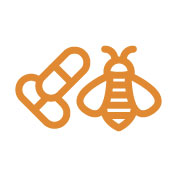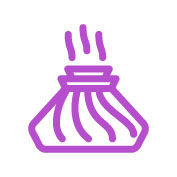
Home Remedies to Stop Bites Itching in Seconds
Although warm, summer weather means more time outdoors, it also means more bugs – like bees, ticks, and mosquitoes. Whether you’ve been out in the garden for a hike, or you’ve just been unlucky – everyone suffers with the annoying itching at some point. Fortunately, most bug bites and stings can be safely treated at home. So, why do insect bites itch? That’s because, when an insect bites you, a mixture of saliva (and even sometimes venom) enters your skin at the bite location. Your immune system responds to this by releasing a mixture of compounds, including the chemical histamine, which attacks foreign substances it sees as potentially harmful, such as salivary proteins from insects, setting off itching, redness, and swelling as a response.
When you scratch an insect bite, this causes the skin to become even more inflamed. Since inflammation causes your skin to itch, you can get into a cycle where scratching will cause even more of an itchy sensation. Scratching may also increase the risk of infection if it breaks the skin. We offer amazing products to ease the itch at home. If the area becomes infected, it will be much itchier and will take longer to heal so, although it is tempting, try not to scratch! Check out our Itch Stop Mosquito Bite Remedy for some at home relief.
Here are some tips to help stop bites itching in seconds:
 For more painful bites, like a bee sting, take an over-the-counter painkiller, such as paracetamol or ibuprofen. Always follow the directions on the label and use the correct dose.
For more painful bites, like a bee sting, take an over-the-counter painkiller, such as paracetamol or ibuprofen. Always follow the directions on the label and use the correct dose.
 For bites that itch, apply an ice pack or an over-the-counter anti-itch cream, such as hydrocortisone. Another option is to take an over-the-counter oral antihistamine. Tablets like Benadryl, directly counter the effects of the histamines that your body releases after a bite.
For bites that itch, apply an ice pack or an over-the-counter anti-itch cream, such as hydrocortisone. Another option is to take an over-the-counter oral antihistamine. Tablets like Benadryl, directly counter the effects of the histamines that your body releases after a bite.
 To reduce swelling, apply an ice pack to the bite. Grab an ice pack or some frozen veg and give your bite 10 to 15 minutes of short-lasting relief.
To reduce swelling, apply an ice pack to the bite. Grab an ice pack or some frozen veg and give your bite 10 to 15 minutes of short-lasting relief.
 Prefer a more natural route? Pure, 100% aloe vera gel is typically a safe bet. “It can help soothe irritated skin, such as from bug bites, because of its anti-inflammatory properties,” Noelani González, M.D., director of cosmetic dermatology at Mount Sinai West in New York recently told Prevention. “It can also help reduce redness in that area.” (Just be sure to test a separate patch of skin first to ensure you have no allergic reaction.)
Prefer a more natural route? Pure, 100% aloe vera gel is typically a safe bet. “It can help soothe irritated skin, such as from bug bites, because of its anti-inflammatory properties,” Noelani González, M.D., director of cosmetic dermatology at Mount Sinai West in New York recently told Prevention. “It can also help reduce redness in that area.” (Just be sure to test a separate patch of skin first to ensure you have no allergic reaction.)
 If you experience any serious symptoms after an insect bite, such as oozing pus at the bite site, warmth in the area, a rash that seems to be spreading, or pain that doesn’t seem to be subsiding, see your doctor immediately. To help the healing process, check out our Beurer Insect Bite Healer.
If you experience any serious symptoms after an insect bite, such as oozing pus at the bite site, warmth in the area, a rash that seems to be spreading, or pain that doesn’t seem to be subsiding, see your doctor immediately. To help the healing process, check out our Beurer Insect Bite Healer.
Although it is difficult to avoid insect bites completely, you can reduce their chances of being bitten by:
• Use insect repellent
• Covering exposed skin as much as possible
• Using mosquito nets at night
• Avoid visiting places with a high density of mosquitoes or other insects
Other Ways to Stop Bites Itching
Rubbing Alcohol - As soon as you notice that you have been bitten, wipe down the area with some rubbing alcohol or alcohol wipes. This can help clean up some of the bug's saliva before it triggers your immune response, helping to stop the swelling and itching. Rubbing alcohol also creates a cooling sensation as it evaporates that distracts from the sensation of itch.
Stop Scratching - The urge to scratch an itchy bug bite is often very tempting but try as hard as you can to resist. Though it feels so satisfying in the moment, scratching can make your bug bites even more inflamed, which may lead to them itching even more. If you find it difficult to resist, try putting a bandage or plaster over the bite.
Cold Tea Bag - Both green tea and black tea have anti-inflammatory properties and so when applied to a bite can help reduce swelling. Simply soak the teabag in boiling water and then allow to cool before applying to your skin. For extra relief, put the teabag in the fridge - the cold will help to soothe your bites.
Baking Soda - Baking soda isn’t just a cooking ingredient, it can also relieve irritation and itchiness. To make a paste, combe 1 tablespoon of baking soda with water. Add enough water to form a paste, and apply to the bug bite, letting it dry before removing with a cool washcloth.
While insect bites and bee stings don't typically warrant medical attention, you should your GP if:
- • you're worried about a bite or sting
- • you have symptoms of a more widespread infection, such as a fever, swollen glands and other flu-like symptoms
- • your symptoms don't start to improve within a few days or are getting worse
- • you've been stung or bitten in your mouth or throat, or near your eyes
- • a large area around the bite becomes red and swollen
- • you have symptoms of a wound infection, such as pus or increasing pain, swelling or redness
